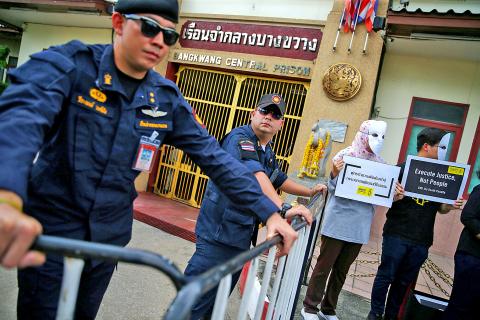Thailand carried out its first execution in nine years, putting to death a man who killed a teenager for his mobile phone, in a move that has drawn condemnation from rights groups.
Theerasak Longji, 26, was executed by injection on Monday after being convicted of aggravated murder for stabbing his 17-year-old victim 24 times to take his phone.
The brutal killing in 2012 drew widespread anger in Thai society and his conviction was upheld in the appeal and supreme courts.

Photo: Reuters
It was Thailand’s first execution since two drug-traffickers were put to death in August 2009, which came after a period of no executions since 2003, Amnesty International said yesterday in a statement that called the execution deplorable.
Theerasak was the seventh convict to be executed by injection since Thailand switched methods in 2003 from a firing squad.
Thailand has executed 326 people since 1930, the Department of Corrections said.
The department on Monday said that Theerasak was executed to be an example to those who think of committing serious crimes.
“Even though many countries have abolished the death sentence, there are still many other countries that still use it, such as the United States and China, who focus on the protection of society and citizens to not become victims of crimes over the priority of the human rights of those who had violated the law,” the statement said. “The Department of Corrections hopes that this execution will serve as a reminder to those who think of committing serious crimes or violating the law to stop and consider this sentence.”
Amnesty International said the execution was a major setback for the country.
“This is a deplorable violation of the right to life,” Amnesty International’s Thailand campaigner Katherine Gerson said. “Thailand is shockingly reneging on its own commitment to move towards abolition of the death penalty and the protection of the right to life, and is also putting itself out of step with the current global shift away from capital punishment.”
The International Federation of Human Rights also condemned the move in Thailand, calling it a “betrayal.”
It said the country would have achieved the status of “de facto abolitionist” had it not carried out any executions before Aug. 24 next year — 10 years after the last death sentences were carried out.
Figures provided to Amnesty by the Thai Ministry of Justice show that 510 people, including 94 women, were on death row at the end of last year.
Nearly 200 had exhausted all final appeals — like Theerasak.
More than half are believed to have been sentenced for drug-related offenses.

Thousands gathered across New Zealand yesterday to celebrate the signing of the country’s founding document and some called for an end to government policies that critics say erode the rights promised to the indigenous Maori population. As the sun rose on the dawn service at Waitangi where the Treaty of Waitangi was first signed between the British Crown and Maori chiefs in 1840, some community leaders called on the government to honor promises made 185 years ago. The call was repeated at peaceful rallies that drew several hundred people later in the day. “This government is attacking tangata whenua [indigenous people] on all

RIGHTS FEARS: A protester said Beijing would use the embassy to catch and send Hong Kongers to China, while a lawmaker said Chinese agents had threatened Britons Hundreds of demonstrators on Saturday protested at a site earmarked for Beijing’s controversial new embassy in London over human rights and security concerns. The new embassy — if approved by the British government — would be the “biggest Chinese embassy in Europe,” one lawmaker said earlier. Protester Iona Boswell, a 40-year-old social worker, said there was “no need for a mega embassy here” and that she believed it would be used to facilitate the “harassment of dissidents.” China has for several years been trying to relocate its embassy, currently in the British capital’s upmarket Marylebone district, to the sprawling historic site in the

‘IMPOSSIBLE’: The authors of the study, which was published in an environment journal, said that the findings appeared grim, but that honesty is necessary for change Holding long-term global warming to 2°C — the fallback target of the Paris climate accord — is now “impossible,” according to a new analysis published by leading scientists. Led by renowned climatologist James Hansen, the paper appears in the journal Environment: Science and Policy for Sustainable Development and concludes that Earth’s climate is more sensitive to rising greenhouse gas emissions than previously thought. Compounding the crisis, Hansen and colleagues argued, is a recent decline in sunlight-blocking aerosol pollution from the shipping industry, which had been mitigating some of the warming. An ambitious climate change scenario outlined by the UN’s climate

BACK TO BATTLE: North Korean soldiers have returned to the front lines in Russia’s Kursk region after earlier reports that Moscow had withdrawn them following heavy losses Ukrainian President Volodymyr Zelenskiy on Friday pored over a once-classified map of vast deposits of rare earths and other critical minerals as part of a push to appeal to US President Donald Trump’s penchant for a deal. The US president, whose administration is pressing for a rapid end to Ukraine’s war with Russia, on Monday said he wanted Ukraine to supply the US with rare earths and other minerals in return for financially supporting its war effort. “If we are talking about a deal, then let’s do a deal, we are only for it,” Zelenskiy said, emphasizing Ukraine’s need for security guarantees